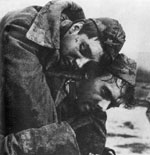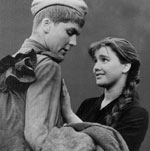  |    |
  |
|
|
Arguably the first masterpiece to come out of the Soviet thaw, The Cranes Are Flying (1957) tells the story of two star-crossed lovers, Veronica and Boris, whose romance is cut short by the German invasion. When Boris (Alexei Batalov) enlists in the military and is immediately shipped off to the front, Veronica (Tatiana Samoilova), alone and desperate, moves in with Boris' family, where she quickly falls under the spell of his predatory brother, Mark, whom she eventually marries. As the war progresses, her guilt over her infidelity begins eating away at her even as she grows into full womanhood. Ultimately, Veronica must reconcile her guilt with the fact that Boris may never return home.
Though the story is straightforward, the telling of it is not. Director Mikhail Kalatazov and his gifted cinematographer Sergei Urusevsky have created a revolutionary visual style. Predating most modern technological conveniences, their camera is free to move with the actors (often through large crowds), to shoot at oblique angles, and to rotate with unprecedented flexibility. To recreate the dizziness of adolescent love, for instance, Urusevsky's camera makes three complete revolutions as it follows Boris up a spiral staircase to Veronica. The shot is further complicated by the fact that the camera seems suspended in midair between floor and ceiling, without any apparent support. A quotation from Urusevsky (provided in the DVD liner notes) explains his intent: "The camera can express what the actor is unable to portray: his inner sensations." Thus is Boris rendered weightless by love and sent spinning upward and upward into the air.
As the story grows darker, the camera plunges with increasing violence into the characters' desperate state of mind. Veronica's mad dash to find Boris before he's shipped off is filmed in one long take using what must have been an early version of a steadicam. The scene starts in a bus with Veronica searching for Boris' face in a crowd of soldiers. The bus comes to halt; she jumps off, throwing herself into an oncoming crowd; she doubles back momentarily, spins around, and weaves through a column of Soviet tanks. The camera stays with her the entire scene, turning and accelerating with ease, though surely a small army of technicians was required to pull it off. Miraculously, the scene ends with the camera craning several stories up as Veronica loses herself amid the tanks. Held for just a few seconds, it's a breathtaking though intimidating panoramic shot of a girl swallowed up by the forces of war.
Tragedy occasions even more visual flair: a crucial death scene is filmed as a death spiral, with the camera spinning wildly out of control before landing in the mud. A literal unwinding of the romantic upsurge we witnessed early in the film, the shot stands as a thematic counterpoint to a later scene in which Veronica tries to commit suicide by throwing herself in front of a train. Her breakneck rendez-vous with death -- filmed by Urusevsky in a hand-held style to emphasize disorientation -- ironically ends up becoming a race to save a life when Veronica forgoes her suicide in favor of rescuing an abandoned child from a car accident. When the child turns out to be named Boris, the camera, now motionless, records the hopefulness in Veronica's eyes with resounding power.
If The Cranes Are Flying is mostly remembered today as a technological triumph (and as a warm-up to Kalatozov's crowning achievement, the voluptuous, insanely beautiful agitprop film I Am Cuba), the Criterion Collection's release does a remarkable job of highlighting the subtleties that contemporary viewers are likely to miss. Among those included in the liner notes are Kalatozov's disdain for jingoism (a Party chant is cut mercifully short), the formal treatment of lurid melodrama (a nod to his experience working in Hollywood), and his whole-hearted embrace of moral ambiguity. These were no small accomplishments in an industry still reeling from Stalin's autocratic legacy. The Cranes Are Flying went on to win the Palme d'Or at the 1957 Cannes Film Festival and unequivocally ushered in the Russian New Wave.
Scarcely two years after Kalatozov's success, Grigori Chukhrai's Ballad of a Soldier swept through the world with its story of Alyosha, a young Russian soldier and his perilous journey home. Equally a coming-of-age tale and a road picture, the movie manages to avoid cliché by revealing in the opening narration that the young Alyosha eventually dies in battle. This revelation casts a shadow over the rest of the film, reshaping what could have been a simple story about a soldier coming home into an elegy to a lost generation.
Alyosha is played by Vladimir Ivashov, an unknown acting student whom director Chukhrai chose over more experienced professionals. Just 20-years old, Ivashov is present in almost every scene and delivers a restrained performance that never insists on his character's goodness. When he is given three days of leave as a reward for single-handedly fending off enemy tanks, Alyosha heads east by rail with the sole intention of helping his elderly mother fix her leaky roof. Along the way he encounters soldiers and civilians for whom war has not been so good. There is an amputee who fears his wife will reject him; a weary war mother who has heard no news from her soldier son; and a cynical transport officer who isn't above accepting a bribe. These wretched displays of humanity might have disenchanted a weaker soldier, but in Alyosha's case, they only strengthen his sense of moral rectitude. When he learns that the wife of one his soldier friends has committed adultery, he makes his outrage known by repossessing the present he was commissioned to give to her.
Thus described, Alyosha seems like a saint. He doesn't have a corrupt bone in his body. His romance with a beautiful young stowaway named Shura (Zhanna Prokhorenko) is completely chaste, not even a kiss. Framed against a setting sun, their hair blowing in the wind, the two lovebirds stare into each others eyes but dare go no further. By today's standards, they seem prudish, but as the liner notes for the DVD point out, their romance represented a great step forward from the sobering asexuality of Stalin-era films. Either way, Alyosha exists above carnality. When he eventually gives up Shura so that he can be with his mother, it is meant to be an act of self-sacrifice, the individual parting with what is dearest to him for the sake of the homeland. And indeed, Alyosha's mother is Russia incarnate, a grand, weeping Earth mother who literally emerges from the wheat fields to embrace her son.
A story flowing with this much sanctimony needs the hand of a realist, and Grigori Chukhrai, directing a screenplay he co-wrote with Valentin Yezhov (and which was nominated for an Academy Award), has clearly brought his experiences as a war veteran to bear. Eschewing flashy camera technique, Chukhrai uses an understated visual style to capture the ruggedness of his country. It's a style reminiscent of the great silent director Aleksandr Dovzhenko, but as Chukhrai insists in a brief radio interview included on the DVD, he explicitly avoids imitating other directors. If nothing else, Chukhrai's mise-en-scene is oddly singular. From the nightmarish battle scene that opens the film to a stark long shot of the countryside that closes it, Chukhrai's composition has an eerie interior quality throughout, as if he were drawing on his own memories of war. It is a deeply personal style of directing, but also one that is devoid of any complex emotional hangover. These are memories in their simplest form.
Chukhrai's direction to his actors must have been similarly spare: be yourselves. As Alyosha, Ivashov doesn't have to act innocent; he is innocent. His effortless embodiment of youth, with all of its unrehearsed moments, anchors the movie in reality. He convinces us with his unforced screen presence that such a person like Alyosha could exist amid all this carnage and destruction. Like Veronica in The Cranes Are Flying, he transcends his earthly predicaments, teaching us through example how a nation -- Russian, Soviet, or otherwise -- can rise above the horrors of war by returning to a state of preternatural calm.
The Cranes Are Flying and Ballad of a Soldier are now available on DVD from The Criterion Collection. Both films are presented in new digital transfers. Ballad of a Soldier includes interviews with director Grigori Chukhrai and stars Vladimir Ivashov and Zhanna Prokhorenko, conducted after a preview screening in New York. Suggested retail price: $29.95 each. For more information, check out The Criterion Collection Web site.
|